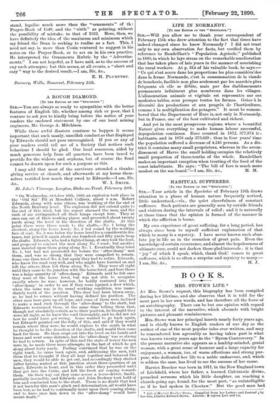LIFE IN NORMANDY.
[TO THE EDITOR OF THE " SPECTATOR.”]
you allow me to thank your correspondent of February 15th who drew attention to the fact that times have- indeed changed since he knew Normandy ? I did not trust only to my own observation for _facts, but verified them by reference to Baudrillart's " Population Agricole," published in 1880, in which he lays stress on the remarkable amelioration that has taken place of late years in the manner of nourishing the rural workers. At p. 314 of his valuable book, he says :- " Ce qui s'est acorn dans lea proportions lee plus considerables dans in ferme Normande, e'est la. consommation de la viande de boucherie, facilitee non plus seulement par les marches_plus. frequents oil elle se &bite, mais _par des .etablissements permanents infmiment plus nombreux dans lee villages. L'alimentation animak et vegetak est represent& am- oes modestes tables, sons presque toutes les formes. Grike a la diversite des productions et aux progres de l'horticulture, comme ii la multiplication des potagers." It must be remem- bered that the Department of Eure is, not only in Normandy, but in France, one of the best cultivated and richest.
And yet in the most prosperous regions, where a bountiful Nature gives everything to make human labour successful, depopulation continues. Eure counted in 1872, 377,874 it habitants, and in 1876 only 373,629 ; thus in four years' time the population suffered a decrease of 4,245 persons. As a dis- trict it contains many small proprietors, whereas in the arron- dissement of Havre the small holding occupies the relatively small proportion of three-tenths of the whole. Baudrillart makes an important exception when treating of the food of the coast inhabitants. He says : " The bill of fare is much more
modest on the sea-board."--I am, Sir, &c., M. M.






































 Previous page
Previous page